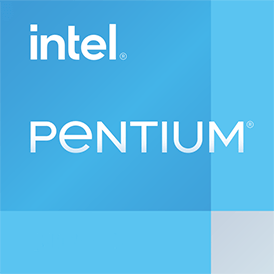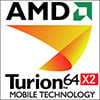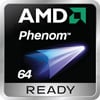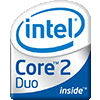
Intel Pentium D 915 Benchmark, Test and specs
Last updated:
The Intel Pentium D 915 has 2 cores with 2 threads and is based on the 0. gen of the Intel Pentium series. The processor uses a mainboard with the LGA 775 socket and was released in Q3/2006. The Intel Pentium D 915 scores 208 points in the Geekbench 5 single-core benchmark. In the Geekbench 5 multi-core benchmark, the result is 381 points.

| Name: | Intel Pentium D 915 |
|---|---|
| Family: | Intel Pentium (150) |
| CPU group: | Intel Pentium D (6) |
| Architecture: | Presler |
| Segment: | Desktop / Server |
| Generation: | 0 |
| Predecessor: | -- |
| Successor: | -- |
CPU Cores and Base Frequency
The Intel Pentium D 915 has 2 CPU cores and can calculate 2 threads in parallel. The clock frequency of the Intel Pentium D 915 is 2.80 GHz. The number of CPU cores greatly affects the speed of the processor and is an important performance indicator.
| CPU Cores / Threads: | 2 / 2 |
|---|---|
| Core architecture: | normal |
| Cores: | 2x |
| Hyperthreading / SMT: | No |
|---|---|
| Overclocking: | No |
| Frequency: | 2.80 GHz |
| Turbo Frequency (1 Core): | -- |
| Turbo Frequency (2 Cores): | -- |
Memory & PCIeThe processor can use up to memory in 0 memory channels. The maximum memory bandwidth is --. The memory type as well as the amount of memory can greatly affect the speed of the system. |
|
| Memory type: | Memory bandwidth: |
|---|---|
| DDR2 | -- |
| Max. Memory: | |
| Memory channels: | 0 |
| ECC: | No |
| PCIe: | |
| PCIe Bandwidth: | -- |
Thermal ManagementThe thermal design power (TDP for short) of the processor is 95 W. The TDP specifies the necessary cooling solution that is required to cool the processor sufficiently. The TDP usually gives a rough idea of the actual power consumption of the CPU. |
|
|---|---|
| TDP (PL1 / PBP): | 95 W |
| TDP (PL2): | -- |
| TDP up: | -- |
| TDP down: | -- |
| Tjunction max.: | -- |
Technical details
The Intel Pentium D 915 is made in 65 nm. The smaller the manufacturing process of a CPU, the more modern and energy-efficient it is. Overall, the processor has 4.00 MB cache. A large cache can greatly speed up the processor's speed in some cases such as games.
| Technology: | 65 nm |
|---|---|
| Chip design: | Monolithic |
| Socket: | LGA 775 |
| L2-Cache: | 4.00 MB |
| L3-Cache: | -- |
| AES-NI: | No |
| Operating systems: | Windows 10, Linux |
| Virtualization: | None |
|---|---|
| Instruction set (ISA): | x86-64 (64 bit) |
| ISA extensions: | -- |
| Release date: | Q3/2006 |
| Release price: | 74 $ |
| Part Number: | -- |
| Documents: | Technical data sheet |
Rate this processor
Benchmark results

The benchmark results for the Intel Pentium D 915 have been carefully checked by us. We only publish benchmark results that have been created by us or that have been submitted by a visitor and then checked by a team member. All results are based on and fullfill our benchmark guidelines.
Screenshots:
Screenshots:
- Geekbench 3.4.4 (2GB DDR2-266), Windows 10 Pro
- Geekbench 5.4.4 (2GB DDR2-266), Windows 10 Pro
- Cinebench R23 (2GB DDR2-266, Windows 10)
- Cinebench R20 (2GB DDR2-266), Windows 10 Pro
- Cinebench R15 (2GB DDR2-266), Windows 10 Pro
- Cinebench R11.5 (2GB DDR2-266), Windows 10 Pro
Cinebench R23 (Single-Core)
Cinebench R23 is the successor of Cinebench R20 and is also based on the Cinema 4 Suite. Cinema 4 is a worldwide used software to create 3D forms. The single-core test only uses one CPU core, the amount of cores or hyperthreading ability doesn't count.

|
AMD Athlon II X2 260u
2C 2T @ 1.80 GHz |
||

|
Intel Celeron N3350
2C 2T @ 2.40 GHz |
||

|
Intel Pentium Gold 4417U
2C 4T @ 2.30 GHz |
||

|
AMD Athlon II X2 250u
2C 2T @ 1.60 GHz |
||
|
|
Intel Pentium D 915
2C 2T @ 2.80 GHz |
||

|
AMD Turion 64 MK-36
1C 1T @ 2.00 GHz |
||

|
Intel Atom x5-Z8350
4C 4T @ 1.92 GHz |
||
Cinebench R23 (Multi-Core)
Cinebench R23 is the successor of Cinebench R20 and is also based on the Cinema 4 Suite. Cinema 4 is a worldwide used software to create 3D forms. The multi-core test involves all CPU cores and taks a big advantage of hyperthreading.

|
AMD Athlon II X2 270u
2C 2T @ 2.00 GHz |
||

|
AMD Athlon II X2 260u
2C 2T @ 1.80 GHz |
||

|
Intel Atom x5-Z8350
4C 4T @ 1.92 GHz |
||

|
AMD Athlon II X2 250u
2C 2T @ 1.60 GHz |
||

|
Intel Celeron N3350
2C 2T @ 2.40 GHz |
||
|
|
Intel Pentium D 915
2C 2T @ 2.80 GHz |
||

|
AMD Turion 64 MK-36
1C 1T @ 2.00 GHz |
||
Geekbench 5, 64bit (Single-Core)
Geekbench 5 is a cross plattform benchmark that heavily uses the systems memory. A fast memory will push the result a lot. The single-core test only uses one CPU core, the amount of cores or hyperthreading ability doesn't count.

|
AMD Phenom X4 9600
4C 4T @ 2.30 GHz |
||

|
Intel Celeron N3000
2C 2T @ 2.08 GHz |
||

|
Intel Atom Z3736F
4C 4T @ 2.16 GHz |
||
|
|
Intel Pentium D 915
2C 2T @ 2.80 GHz |
||

|
AMD GX-415GA
4C 4T @ 1.50 GHz |
||

|
AMD Athlon 5150
4C 4T @ 1.60 GHz |
||

|
Intel Celeron 1019Y
2C 2T @ 1.00 GHz |
||
Geekbench 5, 64bit (Multi-Core)
Geekbench 5 is a cross plattform benchmark that heavily uses the systems memory. A fast memory will push the result a lot. The multi-core test involves all CPU cores and taks a big advantage of hyperthreading.

|
Intel Celeron 1019Y
2C 2T @ 1.00 GHz |
||

|
Qualcomm Snapdragon 615
8C 8T @ 1.50 GHz |
||

|
Intel Celeron E1400
2C 2T @ 2.00 GHz |
||
|
|
Intel Pentium D 915
2C 2T @ 2.80 GHz |
||

|
Intel Pentium T2310
2C 2T @ 1.46 GHz |
||

|
Qualcomm Snapdragon 427
4C 4T @ 1.40 GHz |
||

|
Samsung Exynos 7578
4C 4T @ 1.50 GHz |
||
Cinebench R20 (Single-Core)
Cinebench R20 is the successor of Cinebench R15 and is also based on the Cinema 4 Suite. Cinema 4 is a worldwide used software to create 3D forms. The single-core test only uses one CPU core, the amount of cores or hyperthreading ability doesn't count.

|
AMD Turion 64 MK-36
1C 1T @ 2.00 GHz |
||

|
AMD Athlon 5150
4C 4T @ 1.60 GHz |
||

|
Intel Pentium N3710
4C 4T @ 2.56 GHz |
||
|
|
Intel Pentium D 915
2C 2T @ 2.80 GHz |
||

|
Intel Celeron N2930
4C 4T @ 2.16 GHz |
||

|
Intel Celeron J1900
4C 4T @ 2.42 GHz |
||

|
Intel Celeron N2920
4C 4T @ 2.00 GHz |
||
Cinebench R20 (Multi-Core)
Cinebench R20 is the successor of Cinebench R15 and is also based on the Cinema 4 Suite. Cinema 4 is a worldwide used software to create 3D forms. The multi-core test involves all CPU cores and taks a big advantage of hyperthreading.

|
Intel Atom x5-Z8350
4C 4T @ 1.92 GHz |
||

|
Intel Celeron N2820
2C 2T @ 2.39 GHz |
||

|
Intel Atom x5-Z8300
4C 4T @ 1.84 GHz |
||
|
|
Intel Pentium D 915
2C 2T @ 2.80 GHz |
||

|
AMD E-350
2C 2T @ 1.60 GHz |
||

|
AMD G-T48E
2C 2T @ 1.40 GHz |
||

|
AMD Turion 64 MK-36
1C 1T @ 2.00 GHz |
||
Estimated results for PassMark CPU Mark
Some of the CPUs listed below have been benchmarked by CPU-monkey. However the majority of CPUs have not been tested and the results have been estimated by a CPU-monkey’s secret proprietary formula. As such they do not accurately reflect the actual Passmark CPU mark values and are not endorsed by PassMark Software Pty Ltd.

|
Intel Atom S1220
2C 4T @ 1.60 GHz |
||

|
Intel Atom S1240
2C 4T @ 1.60 GHz |
||

|
AMD E-450
2C 2T @ 1.65 GHz |
||
|
|
Intel Pentium D 915
2C 2T @ 2.80 GHz |
||

|
Intel Celeron 450
1C 1T @ 2.20 GHz |
||

|
Intel Celeron N2810
2C 2T @ 2.00 GHz |
||

|
MediaTek MT6739
4C 4T @ 1.50 GHz |
||
Cinebench R15 (Single-Core)
Cinebench R15 is the successor of Cinebench 11.5 and is also based on the Cinema 4 Suite. Cinema 4 is a worldwide used software to create 3D forms. The single-core test only uses one CPU core, the amount of cores or hyperthreading ability doesn't count.

|
Intel Celeron N3000
2C 2T @ 2.08 GHz |
||

|
Intel Celeron N3150
4C 4T @ 2.08 GHz |
||

|
Intel Celeron N2807
2C 2T @ 2.16 GHz |
||
|
|
Intel Pentium D 915
2C 2T @ 2.80 GHz |
||

|
AMD Athlon 5150
4C 4T @ 1.60 GHz |
||

|
Intel Celeron N2815
2C 2T @ 2.13 GHz |
||

|
Intel Atom x5-Z8350
4C 4T @ 1.92 GHz |
||
Cinebench R15 (Multi-Core)
Cinebench R15 is the successor of Cinebench 11.5 and is also based on the Cinema 4 Suite. Cinema 4 is a worldwide used software to create 3D forms. The multi-core test involves all CPU cores and taks a big advantage of hyperthreading.

|
Intel Celeron N2807
2C 2T @ 2.16 GHz |
||

|
Intel Celeron N2815
2C 2T @ 2.13 GHz |
||

|
Intel Celeron N3000
2C 2T @ 2.08 GHz |
||
|
|
Intel Pentium D 915
2C 2T @ 2.80 GHz |
||

|
Intel Celeron N2806
2C 2T @ 2.00 GHz |
||

|
Intel Celeron N2810
2C 2T @ 2.00 GHz |
||

|
Intel Pentium D1509
2C 2T @ 1.50 GHz |
||
Benchmarks

Cinebench R23 (SC)
586 entries
586 entries

Cinebench R23 (MC)
565 entries
565 entries

Geekbench 5 (SC)
2,488 entries
2,488 entries

Geekbench 5 (MC)
2,461 entries
2,461 entries

Cinebench R20 (SC)
656 entries
656 entries

Cinebench R20 (MC)
604 entries
604 entries

PassMark CPU-Mark
2,392 entries
2,392 entries

Cinebench R15 (SC)
1,106 entries
1,106 entries

Cinebench R15 (MC)
1,101 entries
1,101 entries

Geekbench 3 (SC)
942 entries
942 entries

Geekbench 3 (MC)
938 entries
938 entries

Cinebench R11.5 (SC)
825 entries
825 entries

Cinebench R11.5 iGPU
383 entries
383 entries
Popular comparisons
back to index







